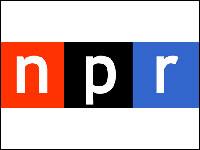Transcript
After only 18 months as the head of National Public Radio, CEO Ken Stern stepped down on Thursday by, quote, “mutual agreement” with the 17-member board. Stern’s ideas about the direction of Public Radio, including an aggressive push into digital media, met with resistance from influential member stations, who pay annual dues to NPR.
Karen Everhart is a senior editor of the public broadcasting newspaper Current. We called her at home not long after word broke of Stern’s departure, and I asked her if she was surprised.
KAREN EVERHART:
Well, I am surprised, given NPR’s announcement yesterday that they had completed a deal to buy a new building in the District of Columbia for their new headquarters, which had been a key focus of Ken Stern’s work at NPR over the last few months.
BOB GARFIELD:
And as the press release marking his departure points out, in his tenure NPR’s audience has doubled, and he leaves the network in what the press release described as very healthy financial condition.
But he made some enemies along the way, and I wonder if you’d care to tell me, you know, who exactly had it in for him?
KAREN EVERHART:
When I first came on the beat of covering public radio, which was just last spring, I was really surprised by the amount of dislike that people expressed about Ken Stern, and to me, it was really puzzling, because he seemed like a really competent and smart guy.
And I would ask people who have been involved in public radio for years, well, why is this? Why don’t people like him?
And one person said, you know, you just got to take into account that he was the COO for years and he took the tough stance in union negotiations, and he just wasn’t popular.
BOB GARFIELD:
In his efforts to kind of drag public broadcasting kicking and screaming into the digital age, he’s also made some controversial decisions which some in the station community thought were high-handed or arrogant, or something, but which left some bitter feelings.
KAREN EVERHART:
Well, the things that were most evident to me were with this new online music service that NPR launched last fall, where some stations were invited to participate as sort of founding stations and many others felt like they were being bypassed, that NPR was inviting their listeners to tune out from their stations and to tune in to all these other stations on the Internet.
And there were quite a few stations that were unhappy that they seemed to have been cut out of that opportunity.
BOB GARFIELD:
Now, you could argue that the digital revolution eventually will render individual broadcast stations obsolete if they view themselves as simply providing music and news content over the air to local listeners, because that can all be done centrally via podcasts and online streaming.
And one of the challenges facing public radio is to find a way for stations, who, [LAUGHS] by the way, raise most of the money, to continue to be relevant in the 21st century.
KAREN EVERHART:
I think stations recognize the challenge that they have but they don’t trust current NPR management to help them navigate it. [LAUGHS] I just covered an NPR board meeting in February where they presented the results of a recent member survey, and only 49 percent said that they thought that NPR management actively listened to their concerns.
And I think there’s a real split right now over this idea that NPR needs to become a multimedia organization, or whether it needs to really focus on its core service of delivering really solid radio journalism.
BOB GARFIELD:
Comes now the tenure of Dennis Haarsager who had been chairman of the board. He’s leaving that post in order to be interim CEO while a national search for a replacement is conducted. What do you know about Haarsager and what do you think we and the public radio broadcasting community can expect from his tenure, whatever length it turns out to be?
KAREN EVERHART:
Dennis Haarsager is a really forward-looking station manager. He’s been in the system for a very long time. He’s really well respected, and he really thinks a lot about digital technology and how it’s going to affect media, not just the stations, but large organizations such as PBS and NPR. He served on the PBS board for many years too, and has been involved in many of their technological breakthroughs with program distribution.
So I think that in a time when there’s a lot of distrust about what’s happening at NPR, at least among the stations, Dennis Haarsager is a person that people will trust to move them in the right direction, because he’s tried to navigate through all these challenges himself, as a station manager.
Whenever a big CEO leaves in public broadcasting, there’s always a debate, you know – well, is the next person going to be an insider or an outsider? And Ken Stern, in a way, was an insider because he’d been at NPR before. But he didn’t come from the station community, and you know, to a lot of people, having someone who’s one of their colleagues, who’s really respected and knows a lot of people, knows his way around and thinks a lot about where things are headed, that can be just what they want.
BOB GARFIELD:
Karen, thank you so much.
KAREN EVERHART:
Thank you, Bob.
BOB GARFIELD:
Karen Everhart is the senior editor of Current. In the spirit of full disclosure, WNYC, the station that produces this show, is participating in NPR’s digital music project.
